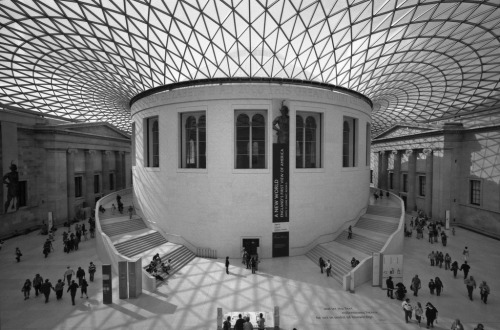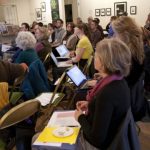CREATIVE CAREERS: HOW TO GET A JOB AT A MUSEUM
“Be prepared to bring your special expertise to the forefront”
Are you searching for a creatively satisfying career? Perhaps you don’t know where to begin. Well, good news! NYFA is launching a Creative Careers series to help you learn about diverse job opportunities in the arts. Each week we’ll highlight an array of occupations and explore the experience & education needed to land a coveted position. You’ll also find resume tips and the helpful information about interviewing.
So, what are you waiting for?
Take a look at our 1st post below: How to land a job at a museum?
If you’re an artist that loves art and history, working in a museum might be the perfect place to start your career. There are thousands of museums nationwide, ranging from world famous institutions like the Museum of Modern Art to smaller museums in local communities like Philadelphia’s Magic Garden. Although, it’s an competitive sector, museums are filled with incredible professional opportunities that deserve your attention. From curators to conservators, we’ll provide a rundown of careers to explore and advice on how to make your resume stand out:
Archivist
Archivists appraise, edit, and maintain historically valuable documents at museums. They may take care of manuscripts, maps, websites, photographs, films, and audio recordings. The field is a unique combination of technical expertise in preservation, along with the knowledge of information-management systems. Most archivists coordinate educational and public outreach programs, such as tours, lectures, and classes. Their understanding of artifacts can provide valuable historical context to the museum’s programming. Archivists typically do the following:
- Authenticate historical documents and archival materials
- Create and maintain digital archives and databases
- Organize and classify archival records
- Find new materials and supervise their purchase and display
Education Needed: Aspiring archivists should obtain a bachelor’s degree in history, art, or another area – such as music or biology – in which they might want to specialize. An internship or research assistant position at a museum can help you gain experience in the field. Training in skills such as technical writing and data management are also beneficial.
Curator
Curators have distinct roles at museums. Their primary task is acquiring and displaying collections of artwork on behalf of the institution. Yet on a day-to-day basis, curators do much more than handle artwork and design museum exhibits. They work closely with exhibition producers, museum directors, and board members to grow the museum and educate the public. The specific responsibilities of a curator can vary from museum to museum. Curators typically do the following:
- Acquire and exhibit collections
- Select the theme and design of exhibits
- Design, organize, and conduct tours and workshops for the public
- Attend civic events to promote their institution
- Direct and supervise curatorial, technical, and student staff
Education Needed: To become a museum curator, you’ll most likely want to major in history or art history for your bachelor’s degree. In bigger institutions, a master’s or PHD may be required as well. Curators usually specialize in a particular subject, such as Medieval Art, Indonesia sculpture, or even paleography. In addition, participating in academic research is important in gaining recognition as an expert in your field.
Conservators
Conservators are trained professionals that repair and preserve a variety of historical objects at museums. This could mean anything from removing dust from fossils to safeguarding classic paintings from the 16th century. Conservation involves learning different scientific techniques and methods of protecting artifacts. Conservators typically do the following:
- Clean objects such as fossils, ancient sculptures and artifacts
- Conduct chemical tests to determine the time frame and condition of objects
- Restore historical paintings
- Create copies of artifacts
- Determine the proper climate-control measures for the preservation of objects
Education Needed: Museum conservators typically need a bachelor’s degree in conservation, history or library science. Aspiring conservators may complete apprenticeship or internships to gain practical experience. Many conservators will specialize in one type of conservation such as textiles or fabrics.
Museum educator
A museum educator works in a museum’s education department developing community programs and aiding the museum’s overall mission. Within each institution, educators support a wide range of activities. Their primary role is shaping the visitor experience and providing forums for dialogue within the community. Museum educators typically do the following:
- Design and conduct educational programs for adults and children
- Serve on exhibition development teams
- Create in-museum and online learning resources
- Coordinate interactive activities for families and school groups
Education Needed: A bachelor’s degree in education, art history, or related humanities fields is usually required. Most museum educators are knowledgeable about teaching methods in the classroom and how to apply educational curriculum to curatorial collections & programs.
For anyone considering a career in museums, volunteering and interning are key components in gaining professional experience.
Lisa Dowd, Manager of Human Resources at the Whitney Museum in New York, encourages applicants to continually build their resumes and gain exposure at cultural organizations. Every institution relies on staff with varied training to carry out their missions to educate and engage visitors. “Have a positive and flexible attitude when going on interviews. Most importantly, be yourself,” says Dowd, “Always be prepared to bring your special expertise to the forefront.”
Looking for a job at a museum? Search NYFA Classifieds for the latest job openings and opportunities!
Some Current Openings:
IFPDA Curatorial Internship at the Grunwald Center for the Graphic Arts, Hammer Museum – Los Angeles, CA
Visitor Services Manager, Louis Armstrong House Museum – Corona, NY
Corporate Relations Associate, Brooklyn Museum – Brooklyn, NY
Richard Armstrong Curator of Modern & Contemporary Art, Carnegie Museum of Art – Pittsburgh, PA
Program Coordinator, Affiliate Programs, The Museum of Modern Art – New York, NY
Grant Writer, External Affairs and Administration, Bronx Children’s Museum – Bronx, NY
Let us know what careers you’d like to learn more about by visiting us on Twitter: @nyfacurrent and using the hashtag #NYFACreativeCareers
– Glory Edim, Program Associate, Online Resources
Images: Top: Drew Leavy, The Great Courtyard of the British Museum. Homepage Slider: Julian Kytasty (Fellow in Folk/Traditional Arts ’12), Sviatyj Bozhe (Oh Holy God), 2008.





